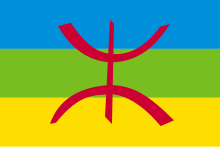Berberism
This article needs additional citations for verification. (December 2009) |

Berberism (Berber: Timmuzɣa or Tamaziɣiẓri) or Amazighism[1] is a Berber political-cultural movement of ethnic, geographic, or cultural nationalism, started mainly in Kabylia, Algeria, and in Morocco and later spreading to the rest of the Berber communities in North Africa. A Berber group, the Tuaregs, have been in rebellion against Mali since 2012, and established a temporarily de facto independent state called Azawad, which identified itself as "Berber".
The Berberist movement in Algeria and Morocco is in opposition to Islamist-driven cultural Arabization and the pan-Arabist political ideology. In Azawad (northern Mali), the Tuareg-Berberist movement is also secularist and is in opposition to both Arabism and perceived discrimination against nomadic Tuaregs by other Malian groups and the government.
Amazigh World Congress
The Amazigh World Congress (CMA, Congrès Mondial Amazigh; Agraw Amaḍlan Amaziɣ) is an international Non-governmental organization which was begun with the purpose of providing a structure and international representation for cultural and political Berber interests. It was formed in September, 1995 in Saint-Rome-de-Dolan, France. It has since held four meetings at irregular intervals, in 1997, 1999, 2002 and 2005 [1].
Algeria

Berberism works for the recognition of the distinct Berber identity in Algeria. Political parties and movements usually considered Berberist include:
- Socialist Forces Front (Front des forces socialistes, FFS)
- Rally for Culture and Democracy (Rassemblement pour la culture et la démocratie, RCD)
- Movement for the Autonomy of Kabylie (Mouvement pour l'autonomie de la Kabylie, MAK)
- Arouch (Mouvement citoyen des Aârchs), a movement that is also organised among Kabyles.
MAK exalts a unique Kabyle identity instead of a universal Berber one, thus also known as Kabylist.
A major movement within the Algerian Berber movement is Anti-Arabism.
Azawad and Mali
Tuareg people in Mali rebelled several times during the 20th century before finally forcing the Malian armed forces to withdraw below the line demarcating Azawad from southern Mali during the 2012 rebellion. On 6 April 2012, the National Movement for the Liberation of Azawad issued a declaration of independence for the territory it claims as a homeland for the Tuareg, a Berber people, citing what it alleged to be discrimination against the indigenous peoples of the Azawad by the government of Mali.[2]
Morocco
Outside Algeria, fringe Berberist political parties and movements existed in Morocco.
The Amazigh Moroccan Democratic Party was founded in 2005 in Rabat to promote Berber identity, political secularism, and Berber cultural rights including the recognition of Berber as the official language of Morocco. The party was banned in 2008 by the Moroccan government but not dissolved. Its chairman, Ahmed Adghirni, announced a court appeal against the government. The party reorganised itself to form the Moroccan Ecologist Party - Greens (Parti écologiste marocain - Izegzawen) in 2006.
Canary Islands

Beginning with Antonio Cubillo's MPAIAC in the early 1970s, some Canarian nationalist organizations have supported Berberism in order to emphasize native Guanche cultural difference with Spanish culture and highlight "Spanish colonialism".[3][4] Although the movements attracted sympathies among local Canarios, the violent terror actions used initially by Cubillo's movement brought about a general rejection.[5] Thus, even after Cubillo publicly renounced the armed struggle in August 1979, he failed to inspire much popular support.[6]
Currently some political organizations in the Canary Islands such as the National Congress of the Canaries (CNC), the Popular Front of the Canary Islands (FREPIC-AWAÑAK), Alternativa Popular Canaria, Canarian Nationalist Party (PNC),[7] Nueva Canarias (NC),[8] Alternativa Popular Canaria (APC),[9] Alternativa Nacionalista Canaria (ANC),[10] Unidad del Pueblo (UP), Inekaren and Azarug espouse the pro-Berber cause in a higher or lower degree.[11] Some of the symbols and colors of the flags of the Canarian pro-independence organizations,[12] as well as the use of the word 'Taknara' (rejected by Cubillo himself) to refer to the archipelago, are seeking to represent Berber cultural roots.[13]
See also
- Berber
- Ethnic nationalism
- Anti-Arabism
- Berber Revolt
- Berber Spring
- Muslim conquest of North Africa
- Berbers and Islam
- Berber Jews
- Christian Berbers
- Arab-Berber
- Arabized Berber
- Kabylism, Algerianism
- Moors
- Barbary Coast
References
- ^ Amazigh North Africa, The West, And The Arab-Islamic Tyranny
- ^ "Déclaration D'Indépendance De L'Azawad" (in French). Mnlamov.net. Retrieved 2012-04-06.
- ^ Carlos Calvet, Geschichte und Mythen der Kanaren, Bohmeier Verlag, Leipzig 2007, ISBN 978-3-89094-517-0
- ^ Canarias. Origen de los antiguos pobladores
- ^ 1975-1980 Años convulsos en la hístoria de Canarias
- ^ El País - Antonio Cubillo, expulsado del MPAIAC
- ^ Partido Nacionalista Canario
- ^ Nueva Canarias official page
- ^ Alternativa Popular Canaria facebook
- ^ Alternativa Nacionalista Canaria page
- ^ Curso de Tamazigh en Ansite
- ^ History of the Canarian Flag
- ^ About the word 'Taknara' used to refer to the Canaries
